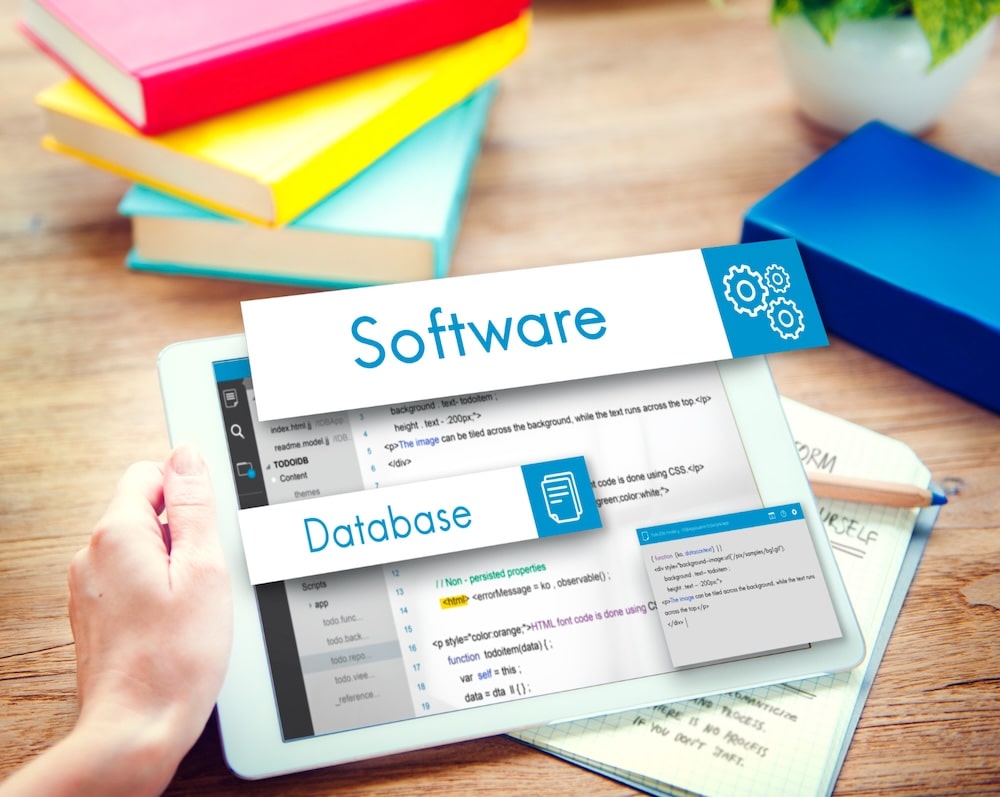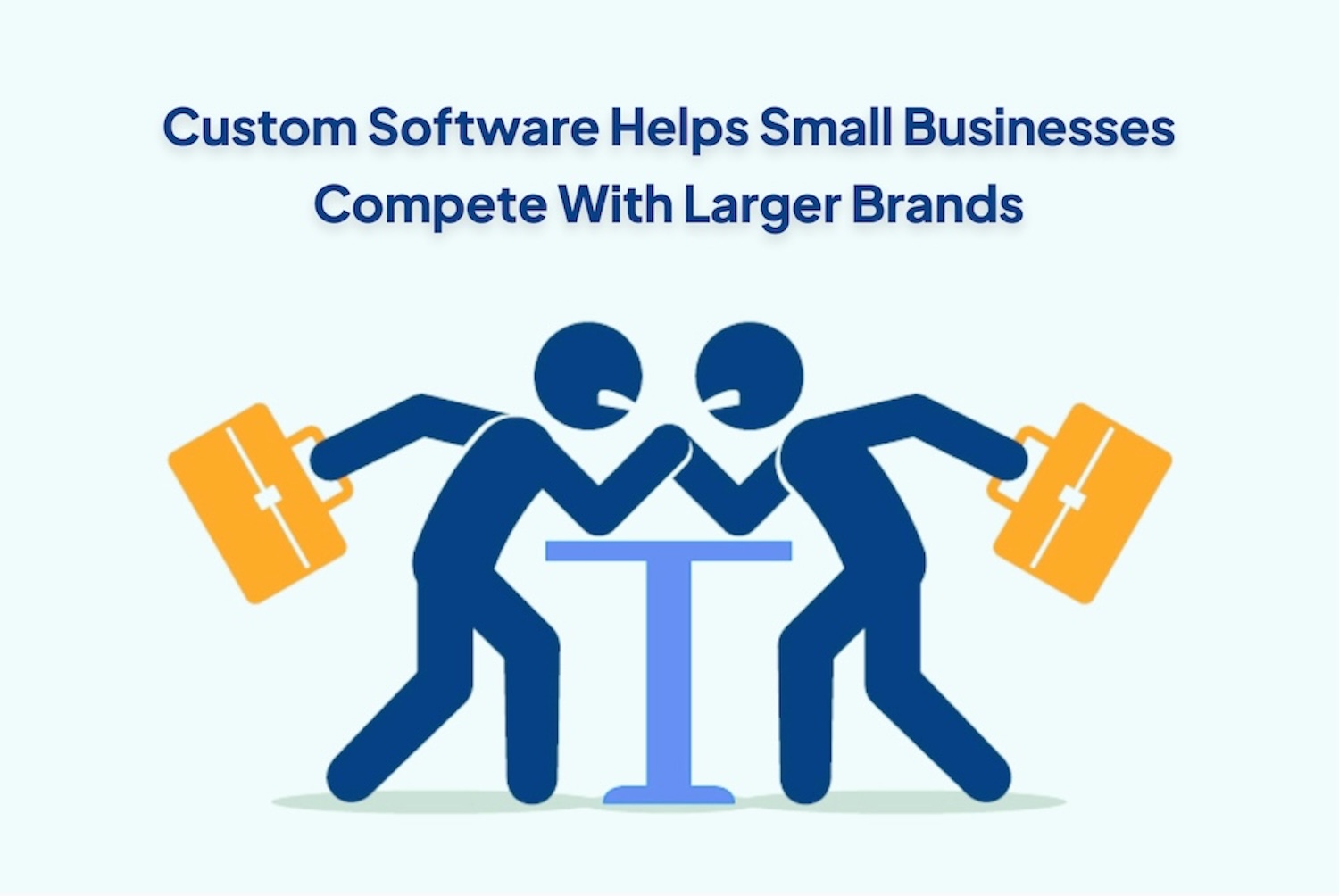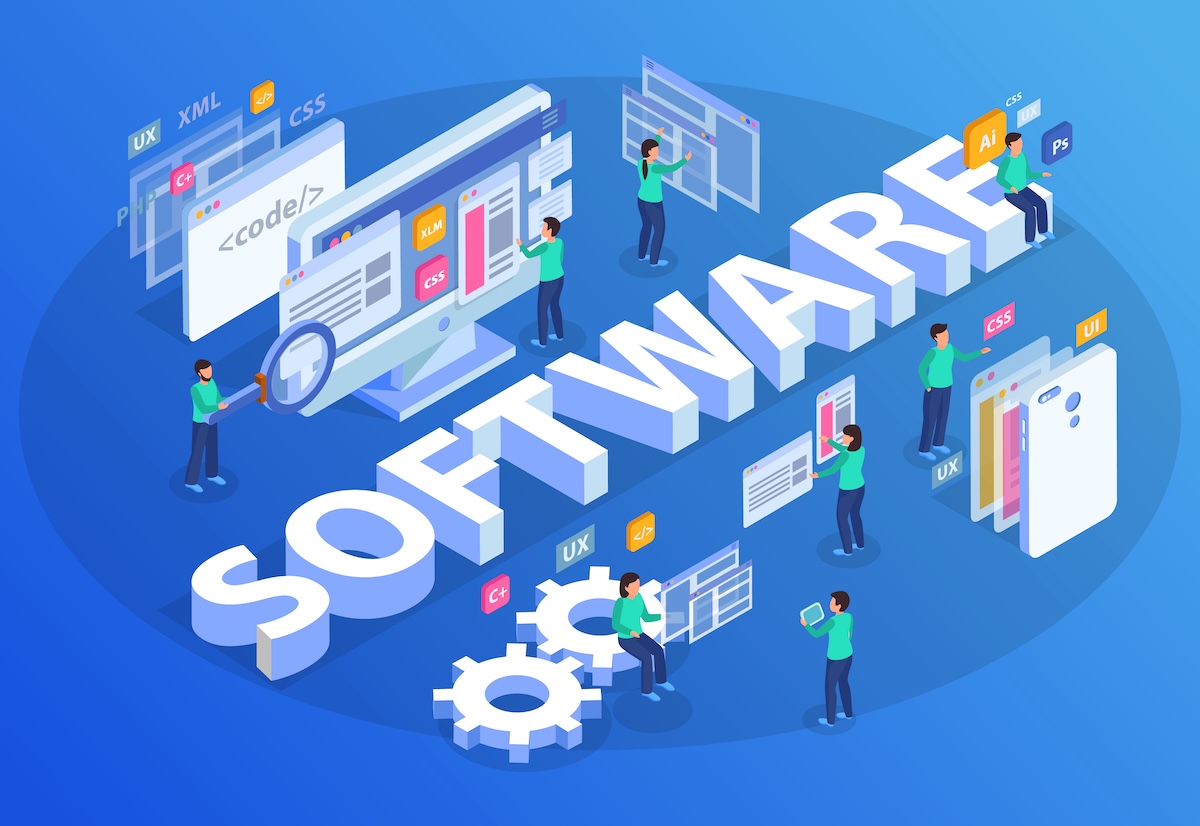Small businesses today face a challenging environment where they are constantly competing with larger, better-funded brands. While it might seem impossible to match the resources of big corporations, there’s one powerful tool that can give small businesses an edge: custom software. In this article, we’ll explore how custom software can help small businesses improve efficiency, deliver a better customer experience, and create a more scalable, competitive solution. Custom software is not just for large enterprises—it can be a game-changer for small businesses looking to compete on their own terms.

What Is Custom Software?
Before we dive into the benefits, let’s first understand what custom software is. Simply put, custom software is a program designed and developed specifically for your business. Unlike off-the-shelf software, which is made for a wide range of users, custom software is tailored to meet the unique needs of your business. For example, if you own a small retail store, off-the-shelf software like Shopify might work for some basic needs. However, if you need specialized features like custom inventory tracking, customer loyalty programs, or integration with your existing systems, custom software can be built to suit those needs.

Why Small Businesses Need Custom Software
While it may seem like custom software is only for large companies, it can actually provide even more value for small businesses. Here are some of the key reasons why small businesses should consider custom software.
1. Custom Software Solves Your Specific Problems
Every business has unique challenges. Small businesses, in particular, often face issues like limited resources, the need to stay agile, and a constant pressure to innovate. Custom software allows you to build a solution that addresses these challenges directly, helping your business run more efficiently. For example:
- A local grocery store can create a custom inventory management system that tracks stock levels, automatically orders new supplies when needed, and alerts managers when certain items are selling out fast.
- A small logistics company can design a route-planning tool that maximizes fuel efficiency and delivery times for each driver.
Off-the-shelf software often includes unnecessary features that your business may never use, or it might lack the specific functionality your team needs to succeed.
2. Improve Efficiency with Automation
Custom software can automate repetitive tasks, saving you time and reducing the chances of human error. From data entry to reporting, automation frees up your team to focus on more important activities, like sales, customer service, and strategy.
For instance, custom software can automatically:
- Process orders and handle payments.
- Generate invoices and send them to customers.
- Update inventory levels and reorder products.
- Send reminders for appointments, meetings, or payments.
3. Personalization for Better Customer Experience
In a competitive market, providing personalized experiences is key to retaining customers. Custom software helps you understand and meet your customers’ needs in a way that off-the-shelf tools can’t.
For example:
- If you run an e-commerce store, custom software can analyze your customers’ shopping habits and recommend products based on past purchases.
- A fitness studio can develop an app that lets clients track their workouts, receive reminders about their class schedules, and offer personalized fitness plans.
- A coffee shop could create a loyalty program where customers earn points for each visit and get rewards based on their preferences, like a free latte on their birthday.
These tailored experiences improve customer satisfaction and keep them coming back.
4. Scalability for Growing Businesses
As your business grows, your needs will evolve. Custom software is built with scalability in mind, meaning it can expand as your business grows. Whether it’s handling more customers, processing more orders, or integrating with new systems, a custom solution can adapt to the increasing demands of your business.
Off-the-shelf software often struggles to scale. For example, an e-commerce platform that works well for a small store may not be able to handle a large influx of orders during peak seasons. Custom software can be adjusted to accommodate growth without having to switch to a new platform.
5. Cost Savings Over Time
Although the initial investment in custom software may be higher, it’s a more cost-effective long-term solution. Off-the-shelf software often comes with ongoing subscription fees, upgrades, and limitations that can become expensive.
Custom software, once developed, typically has lower ongoing costs. You only pay for the features and support you need, and there are no hidden fees for unused functionalities. Moreover, the time and labor savings from automation and efficiency improvements can significantly offset the initial development costs.

How Custom Software Compares to Off-the-Shelf Tools
It’s natural to wonder how custom software stacks up against off-the-shelf tools. Here’s a simple comparison to help you decide which is best for your business.
While off-the-shelf software might seem like a cheaper option, custom software can be more cost-effective in the long run because it’s built specifically for your business.

Real-World Examples of Small Businesses Using Custom Software
Here are a few real-world examples of small businesses using custom software to compete with larger brands:
Example 1: A Local Restaurant
A local restaurant needed a better way to manage its reservations, track customer preferences, and streamline the ordering process. They worked with a developer to create a custom software solution that integrated with their existing point-of-sale system. The new system allowed customers to make reservations online, track their order status in real-time, and even receive personalized offers based on their previous orders. As a result, the restaurant was able to provide a more personalized experience, reduce wait times, and improve customer satisfaction—all with a tailored solution that met their specific needs.
Example 2: A Small E-Commerce Store
A small online retailer that sold handmade jewelry needed a way to track inventory more efficiently and offer a better shopping experience. With off-the-shelf software, they were managing inventory manually, which led to errors and delays. They worked with a software development team to create a custom solution that integrated inventory management with their online store, making it easier to track stock levels, manage orders, and notify customers when items were back in stock.
Example 3: A Fitness Studio
A small fitness studio wanted to improve its client management system. Off-the-shelf tools weren’t able to integrate well with their scheduling software, and they needed something that could track client progress, handle payments, and automate reminders for upcoming classes. Clients could book classes, view their progress, and receive notifications—all through an app designed just for their studio. This streamlined the management process and improved client satisfaction.

How Custom Software Helps Small Businesses Compete with Larger Brands
Small businesses may not have the same resources as large companies, but custom software can help level the playing field. Here’s how:
1. Streamlined Operations and Cost Efficiency
Custom software allows small businesses to streamline operations by automating repetitive tasks and integrating different business functions into one system. For example, a small manufacturer can use custom software to link its inventory, production, and shipping departments in real-time. This eliminates the need for multiple, disconnected systems, reduces errors, and cuts costs. Larger businesses may have dedicated departments and specialized software solutions, but custom software helps small businesses integrate all their processes into a single platform.
2. Improved Customer Insights
Small businesses can use custom software to gather data about customer preferences, buying behavior, and feedback. With this data, you can fine-tune your offerings and marketing strategies. For example:
- A boutique clothing store can use custom software to track customer purchases and predict future trends.
- A small hotel can analyze guest preferences and offer personalized services, such as room upgrades or tailored experiences.
Big brands often rely on generic software tools for customer data, but custom solutions offer a more detailed and accurate understanding of customer needs, allowing small businesses to tailor their approach and build stronger relationships.
3. Flexibility and Agility
Big companies often struggle with their inflexible, outdated software systems. Custom software gives small businesses the ability to remain agile and responsive to changing market conditions. For example, if a new customer trend emerges, a small business can quickly adapt its offerings or marketing strategies using the insights from its custom software. Custom software also allows small businesses to experiment with new ideas without the constraints of off-the-shelf solutions.
4. Competitive Pricing and Unique Value Propositions
By developing a solution that is tailored to your business, you can offer unique value propositions that differentiate you from larger competitors. Whether it’s a customized pricing model, a loyalty program, or unique services, custom software allows you to create offerings that big brands can’t easily replicate.
5. Security and Compliance
Data security is a critical issue for businesses of all sizes. Custom software can be designed with the highest levels of security and compliance in mind, ensuring that sensitive customer data is protected. Off-the-shelf software may not offer the same level of customization for security features, leaving your business vulnerable.
For example, if you run a healthcare clinic, custom software can be built to meet healthcare data compliance regulations like HIPAA, ensuring patient information is securely stored and processed.

Overcoming Common Challenges with Custom Software
While custom software offers many benefits, there are some challenges that businesses should consider:
- Initial Development Cost: Custom software typically involves higher initial development costs compared to off-the-shelf solutions. However, the long-term benefits usually outweigh the upfront investment.
- Time to Develop: Building custom software takes time. Depending on the complexity of the solution, development could take several months. However, the time spent building the software ensures it fits your needs perfectly.
- Ongoing Maintenance: Custom software requires regular updates and maintenance to stay relevant and functional. However, you’ll have control over how and when updates are made, allowing you to focus on the features that matter most to your business.

Custom Software Enhances Data-Driven Decision Making
In today’s business world, data is king. The ability to collect, analyze, and act on data can give small businesses a significant advantage. Custom software provides small businesses with the tools to gather and analyze data in real time, helping them make smarter, more informed decisions.
Key Benefits of Data-Driven Decision Making:
- Better Market Insights: Custom software allows businesses to track customer behavior, purchasing patterns, and trends. This data can provide insights into what products or services are most popular, which marketing campaigns are driving sales, and where improvements are needed.
- Improved Customer Segmentation: By analyzing customer data, custom software can help small businesses better segment their audience. For example, a retail business can group customers based on their buying habits (e.g., frequent shoppers, seasonal buyers, first-time visitors) and create targeted marketing campaigns for each group.
- Optimized Inventory Management: With real-time data from custom software, small businesses can better manage inventory levels, reduce stockouts or overstock situations, and make more accurate demand forecasts.
- Streamlined Reporting and Analytics: Custom software can generate automated reports that provide clear, visual insights into business performance. Whether it’s sales data, customer feedback, or financial performance, custom software can automatically pull together the most important data and present it in an easily digestible format, helping business owners make quick decisions.
- Tracking Key Performance Indicators (KPIs): Custom software can help track and monitor key performance indicators (KPIs) such as customer satisfaction, revenue growth, or employee productivity.

Custom Software Improves Compliance and Regulatory Adherence
For many small businesses, staying compliant with industry regulations can be a daunting task. Whether it’s data protection laws, tax requirements, or industry-specific rules, non-compliance can result in fines or damage to your brand’s reputation. Custom software can be built to help businesses meet these requirements more efficiently and reduce the risk of errors that could lead to compliance issues.
How Custom Software Helps with Compliance:
- Automated Reporting and Documentation: Custom software can automatically generate reports needed for compliance, such as tax filings, health and safety audits, or financial statements. By reducing the need for manual tracking, businesses can ensure they stay on top of deadlines and avoid penalties.
- Built-In Data Security Features: Many industries require strict data protection practices. Custom software can include features that help businesses meet security regulations, such as encryption, secure data storage, and access controls.
- Regulatory Alerts and Reminders: Custom software can be designed to notify business owners and employees of important regulatory deadlines, updates, or changes in compliance rules.
- Audit Trails for Transparency: For businesses that need to maintain transparency for audits, custom software can create detailed audit trails that track all changes, actions, and approvals.
- Industry-Specific Compliance Tools: Custom software can be tailored to meet the unique compliance requirements of different industries. For instance, a construction company can use custom software to track safety protocols, worker certifications, and equipment maintenance logs to stay compliant with OSHA regulations.
Final Thoughts
Custom software can be a game-changer for small businesses looking to stay competitive against larger brands. While the initial cost may be higher than off-the-shelf tools, the long-term benefits such as increased efficiency, better customer experiences, and the ability to scale make it a worthwhile investment. If you're looking to stand out, save time, and create a better experience for both your team and customers, custom software might just be the edge you need.


